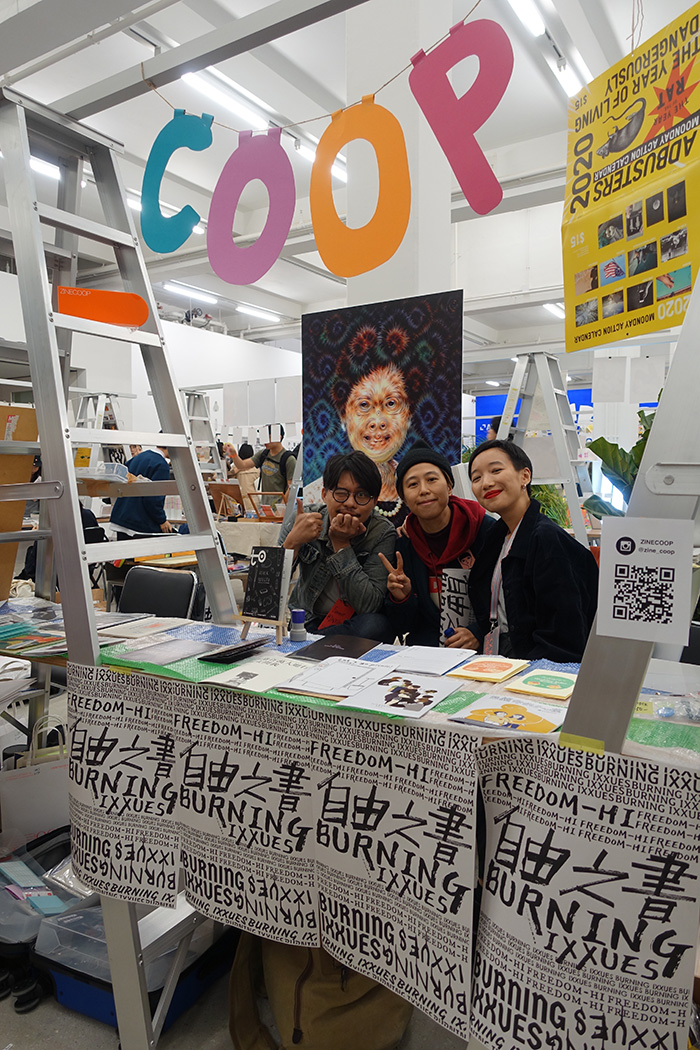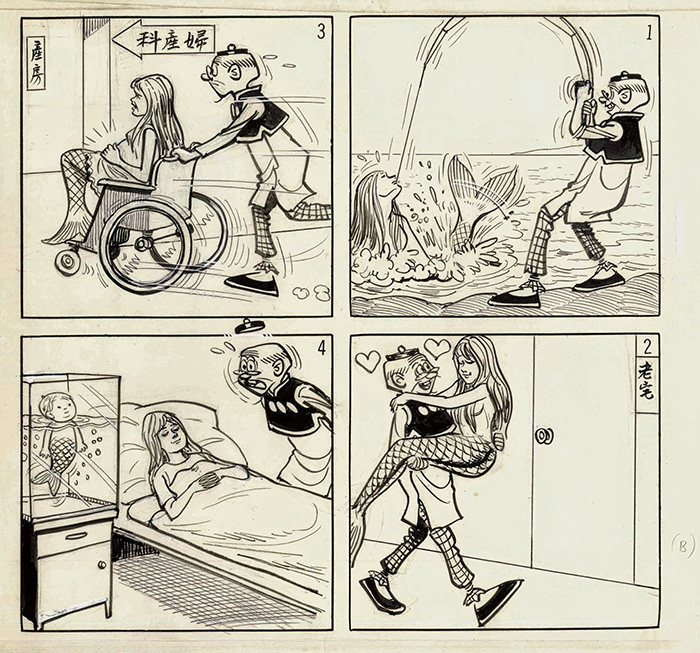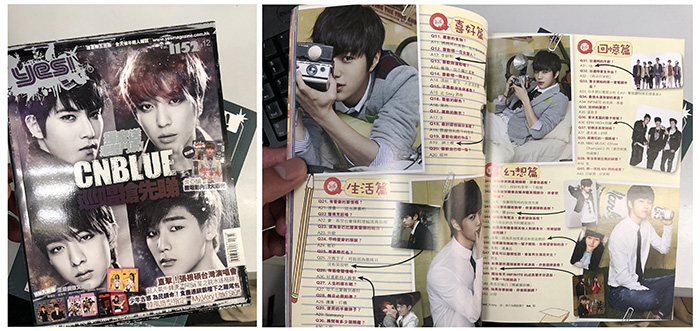Kerry Ann Lee and Forrest Lau

Zine Coop at BOOKED: Hong Kong Art Book Fair 2020.
The following is an abridged version of a conversation between Kerry Ann Lee from Red Letter Distro (Aotearoa, NZ) and Forrest Lau from Zine Coop (Hong Kong) Recorded via Zoom on 13 September 2020.
Kerry Ann Lee: Kia ora Forrest. What time is it in Hong Kong?
Forrest Lau: It’s just past noon.
KAL: And where abouts are you?
FL: I live and work on a small island that’s half-an-hour from Hong Kong Island, called Peng Chau. This is my personal studio and here are some posters from ZINE COOP, which I formed with 4-6 local zine-maker friends in 2017. We didn’t mean to form a so-called ‘group’ but it just happened through some gatherings to share experiences and resources to empower each other.
KAL: Do you know much about zine history in Hong Kong?
FL: Not really. This city has a rich history of publishing. Apart from the mainstream, old zines are rarely mentioned. There’s Art Asia Archive. Ranee from ZINE COOP has done research, so she would be good to chat with about independent publishing history in Hong Kong.
I loved reading comics when I was very young. There used to be small bookstores in front of restaurants where you could buy books before going in to enjoy your meal. (Shows images on desktop) Do you recognise these guys?
KAL: I do. We grew up with Old Master Q/Lou Fu Chi.
FL: Exactly! It also influenced me in my young age. My father bought me these comics before going into the Cantonese restaurants (tea house/ cha lou), to read as a distraction from it being so noisy.
KAL: My dad bought ours from a Chinese grocery shop in New Zealand and gave them to my brother and I to read in the backroom of our family restaurant while my parents were cooking. Lou Fu Chi is this curious guy, sometimes a troublemaker (laughs).
FL: He always makes trouble and feels bad after.
KAL: He’s well-loved in Hong Kong huh? I saw him everywhere.
FL: We share the same memories.
KAL: He’s charming with a really Cantonese-style of silly humour.

Old Master Q/Lou Fu Chi, ‘Reminder of Love’ (1970) by Alfonso Wong
FL: I grew up in Sheung Shui in the most northern part of the New Territories. My grandfather was a farmer and my father was a gardener at Disneyland for 10 years before he retired.
KAL: Wow, he was Mickey’s gardener!
FL: Yeah Mickey Mouse’s ears.
KAL: I went to Hong Kong Disney for the first time on Lunar New Year day.
FL: There mustn’t have been many people there because of the protests. Hong Kong Disneyland is popular with Mainlanders.
KAL: You said that you’ll visit the Hobbit place when you come to New Zealand.
FL: Definitely! I don’t mind being cheesy. It’s a window into a country through what you’re familiar with.
KAL: I agree. All the old crap that’s around is interesting to me. So you grew up in a rural area?
FL: Yes but I never learnt how to farm because for most Chinese students like me, our parents cared about our academic results more than anything in the world. We weren’t allowed out and were forced to study. I got good results and my parents were proud of me. I went to Polytechnic University and have been a graphic designer for more than 10-15 years now (shows online portfolio).
KAL: Wow, so you were designing mainstream K-pop magazines! I see Shinee…
FL: …Super Junior and Girls’ Generation…

K-Pop magazines design by Forrest Lau.
KAL: When I saw you the other day at the café, you said that you had to go back to the office. Were you going back to do this sort of work?
FL: These mainstream magazines don’t exist anymore because the industry has been declining. My day job is a book designer. I began to draw movie posters in my style for fun, and then wrote movie reviews. That was my first zine in 2010.
KAL: So these were film fanzines?
FL: Yes, I started independent publishing through illustration and writing, and then collaborated with other artists. I studied graphic design, engineering and multi-media at Poly U, worked on student union publications, and later found myself in that field.
KAL: I also went to design school and trained as a commercial illustrator. My zines have become more of an arts-based practice now. How do you navigate between commercial design and zine-making?
FL: You have to listen to people very carefully. Clients find you because they have expectations of you to make a product safe. It’s confined in creativity for me to tailor a personal aesthetic towards a market’s lead.
KAL: Your early slick K-Pop, teeny-bopper magazines contrast with the super heartfelt, raw, hand-made zines of Zine Coop. They seem like two very different beasts.
FL: That’s accurate. They’re different beasts with different qualities. Independent publishing interests me because you have to touch the unknown. Most of the time I don’t know what the outcome will be. But I learn and make the most of technologies available, like risograph, with my friends. Each issue has a theme. (Shows riso zines). This one is ‘literary youth’ – about young people like us in Hong Kong who are into literature. This one is about politics. Back in 2014-2015, young people in the city started to think more about politics and began to get more involved. It’s not that long ago.

A Thin Booklet by Forrest Lau.
KAL: It’s remarkable that over this short period of time you have so many young people collectively trying to make sense of big issues through zine-making.
FL: ZINE COOP collects a lot. I think you have a few now?
KAL: Yes. They offer fresh perspectives outside of the internet somehow. It’s inspiring to see zines being so useful for young people in Hong Kong at the moment.
FL: I agree. It’s very on the ground and you can’t see it elsewhere. This one is about family because my dad had passed away. I missed him very much so I started made this zine. It was like self-therapy.
KAL: It’s great that zines can be so many things right? What did you think of BOOKED: Hong Kong Art Book Fair?
FL: We had some small ones but it was the first one at this large scale. (The host institution) Tai Kwun had resources and connections to overseas artists and publishers since launching it in 2019. And of course we’re very grateful that they invited us. We received a huge response to our exhibition (Burning Ixxues) this year featuring zines about the protests. It’s good for local audiences to learn from and be inspired by zines from other places, otherwise people can’t access these publications.
KAL: I saw trade publishers like Taschen and Thames & Hudson in a room out back, while limited edition fanzines and artist editions were foregrounded. There were also people of all ages and backgrounds there. It had a sense that anything was possible. A lot has happened since I saw you, including living and working more online. What do you think the future of zine-making is in Hong Kong?
FL: Everything has been affected by the pandemic. We stopped running zine workshops before that. Book fairs have been postponed. People have too much time and no fixed deadlines now, which is a new experience, as they’re often too busy and rushing. Perhaps people might not create quick work, but more in-depth work.

Burning Ixxues exhibition at BOOKED: Hong Kong Art Book Fair 2020, curated by ZINE COOP.
KAL: Can you identify a particular style, attitude or philosophy that’s currently popular in Hong Kong indie publishing at the moment?
FL: There seems to be a neat and tidy style in the city. Like my early magazine work with the K-idols which maximized visuals, that’s gone. And it wasn’t that long ago – about 8-10 years ago. People are now fond of simple, plain backgrounds with clean typography. It’s very ‘Wes Anderson’ (laughs). Good looking, beautiful, but too careful.
KAL: Yet, you don’t need to have to have gone to art school or design school to make a zine right? A lot of zines are ‘anti-design’ and aren’t concerned about style conventions, which is really freeing.
FL: We’ve been promoting that model a lot, that everybody can do it. Zines have a wide spectrum. Some are easily good looking because of quality formal design aspects. That’s one target.
KAL: That’s one marker of success, but not the only one.
FL: People love your work because you’re true to yourself and how you translate your emotions into printed pages. It’s challenging yet encouraging when it’s more mental or emotional than technical. For technical processes you can Youtube or Google it.
KAL: Do you collect things?
FL: I used to collect soft drink bottle caps as a kid — Coke, Sprite, Fanta, and beer brands from the store in my village.
KAL: Do you still have this collection?
FL: No I lost them a long time ago. It’s a pity. I want to see them again. Also erasers. These are typical in Hong Kong. Do you collect them?
KAL: I have fancy, weird-shaped ‘Made-in-Hong Kong’ erasers. Little TVs, little ice-creams, little toys. They’re just for show but maybe if you had two of the same, you could use one. (laughs).
FL: ZINE COOP collects three copies of each zine: one for our archive and two for display.
KAL: Good idea! When was the last time you did something for the first time?
FL: Last night I had my very first film screening with 8-10 friends here at my apartment in Peng Chau. The Death of Stalin. It’s a hilarious comedy.
KAL: Last night we got bored and went to the cinema, ate junk food and pretended that we were on a plane watching a crappy movie.
FL: I miss plane rides.
KAL: What was the last plane ride you went on?
FL: Last December. I went to Indonesia, and also to Japan for a zine fair in Tokyo. The venue was called The Pool because it once stored water underground and now the water is gone, they have this huge venue for underground activities.
KAL: So it’s literally underground! (laughs). What will destroy you?
FL: If it’s “What am I most afraid of?” I fear losing faith – that everything’s over. I can’t see it yet because I’m still full of hope. I also believe in love between people and I have a lot of solid friendships. Maybe the political situation now makes me fearful because what we have been doing, the zine collecting, is not legal right now. It can put us in a dangerous position, but we’re also very sure that being fearful is not helpful and just try and sort things out like a lot of Hong Kong guys do. We have our resources, connections, skills and experiences. The city has undergone a lot of bad things with constant challenges in front us. I don’t think it’s scary. But we have to be very careful.
KAL: Is the glass half empty, or half full? What is in the glass?
FL: Half full of water. I see water and know that I’m not going to die. I’ll drink some water (drinks a cup of water).
KAL: And finally, can you please share a local secret that a lot of visitors like me might not know about Hong Kong?
FL: I’d encourage you take a bus ride from Tuen Mun to Central. It’s a local route from the northwest part of the New Territories to Hong Kong Island. I recommend it because you can see a lot from the upper decks. Hong Kong is an island and the island is very special to the city. Is Wellington a seashore city?
KAL: It’s a harbour city on an island, just like Hong Kong. When you come over we can take a walk around the harbour.
FL: Definitely, and I will ask you about the local secrets of Wellington.
KAL: For sure.
FL: And of course show me the most cheesy ones too. Like the Hobbit’s cave. (laughs).
Kerry Ann Lee is an artist, designer and scholar from Aotearoa, New Zealand. With a background in graphic art, she creates installation, print and image-based works. Lee regularly exhibits nationally and internationally and is known for her work with self-published fanzines over the past two decades, including the Red Letter Zine Distro, an international punk rock mail-order catalogue-cum-‘occasional distro’ founded in 2001.
FORREST LAU is a graphic and book designer in HK. A cinephile. Creator of ‘A Thin Booklet’, ‘Zinema’ and co-founder of Zine Coop. ZINE COOP is an indie publishing artist collective that promotes zine culture in Hong Kong. It provides support on zine-making and distribution, connecting artists with book fairs while serving as a bridge between distros and potential readers.